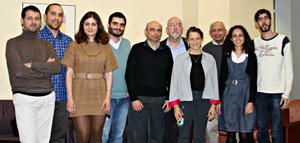
On December 6, 2012, Cynthia Dwork, Distinguished Scientist at Microsoft Research, delivered the 12th Annual Paris C. Kanellakis Memorial Lecture. This lecture series has been held annually by the department in honor of Paris on or around his birthday. In a standing-room only lecture, Dr. Dwork kindly devoted an introduction to Paris, mentioning their close friendship and how much she misses both him and his wife, Maria Teresa Otoya.
The talk, titled “Differential Privacy: Thwarting Big Data’s Evil Twin,” discussed the problem of how to reveal accurate statistics about a population, while still preserving the privacy of individuals. Differential privacy is a rigorous and “ad omnia” definition of privacy that, intuitively, hides the presence or absence of any individual, or small group of individuals, in the data set. Unlike many previous definitions, differential privacy is not binary; instead, privacy loss is quantified, and can be controlled. This quantification, together with powerful composition theorems, permits complex private analyses to be constructed from simple differentially private primitives, or "building blocks."
The talk defined differential privacy, described some basic techniques, and presented a recent result that echoes the speaker’s first collaboration with her friend, Paris Kanellakis. A reception followed the lecture, where Dwork met several current and former Kanellakis Fellows from Brown and MIT and spent time talking with them, sharing memories of Paris and providing advice for successful completion of Ph.D. studies.
Cynthia Dwork, Distinguished Scientist at Microsoft Research, is widely known for placing privacy-preserving data analysis on a mathematically rigorous foundation. Dr. Dwork has also made seminal contributions in cryptography and distributed computing, and is a recipient of the Edsger W. Dijkstra Prize, recognizing some of her earliest work establishing the pillars on which every fault-tolerant system has been built for decades. She is a member of the U.S. National Academy of Engineering and a Fellow of the American Academy of Arts and Sciences.
The Paris C. Kanellakis Memorial Lecture series honors Paris Kanellakis, a distinguished computer scientist who was an esteemed and beloved member of the Brown Computer Science department. Paris joined the department in 1981 and became a full professor in 1990. His research area was theoretical computer science, with emphasis on the principles of database systems, logic in computer science, the principles of distributed computing and combinatorial optimization. He died in an airplane crash on December 20, 1995, along with his wife, Maria Teresa Otoya, and their two young children, Alexandra and Stephanos Kanellakis.
